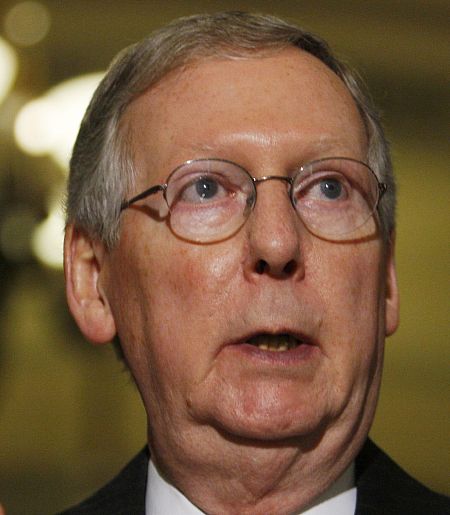 McConnell, a modern-day Unferth?
McConnell, a modern-day Unferth?
What are we to make of the gridlock in the United States Senate these days and the refusal of Republicans and Democrats to cooperate to address the nation’s ills? (In my partisan view, columnist Thomas Friedman is right when he accuses Republicans of never having been more irresponsible, but feel free to assign the blame where you will.) The situation recalls the stasis we encounter in Beowulf following the attacks of Grendel. Allow me to read the epic as an allegory of current politics.
The great hall Heorot has been constructed by the region’s most powerful nation so that the Danish elite can assemble and celebrate. It is a symbol of social stability, the culmination of a succession of successful kings. It signals to the world that nothing is rotten in the state of Denmark.
The reality is different, however. A spirit of fratricidal jealousy has broken out (that’s how I read Grendel) and the king feels stymied. “These were hard times, heartbreaking for the prince of the Shieldings,” we are told. Think of him as Uncle Sam, looking at rising health care costs, significant unemployment, and an ever-increasing deficit and wondering how his kingdom is going to battle them.
He has powerful people telling him what to do, but nothing works. That’s because they are praying to the wrong gods. As the poem puts it,
At pagan shrines they vowed
offerings to idols, swore oaths
that the killer of souls [the devil], might come to their aid
and save the people. That was their way,
their heathenish hope; deep in their hearts
they remembered hell. The Almighty Judge
of good deeds and bad, the Lord God,
Head of the Heavens and High King of the World,
was unknown to them.
Think of these counselors as politicians, offering facile solutions while accepting money from lobbyists and doling out ideological red meat to their followers. The good of their country is unknown to them, at least in these days of relative peace. (If the Danes were being attacked by an external foe, it might be a different story.)
When Beowulf shows up, the future at first looks rosy. Promising to rid the hall of the monster (“Yes, we can rise above what divides us!”), he gladdens the heart. True, he is challenged by the cynical doubter Unferth, a grizzled veteran who, as a slayer of kinsmen, is a human version of Grendel. Unferth is silenced, however, by Beowulf’s optimism and by his accusation that Unferth has failed to address society’s problems. For a while the king feels hope again:
Then the gray-haired treasure-giver was glad;
far-famed in battle, the prince of Bright-Danes
and keeper of his people counted on Beowulf,
on the warrior’s steadfastness and his word.
So the laughter started, the din got louder
and the crowd was happy.
Beowulf is initially successful: he slays Grendel (say, he shepherds through a stimulus bill with some bipartisan support) and hope is kept alive. But less than 24 hours later (by the end of Obama’s first year?), Denmark finds itself plunged back into stasis again. Slaying one problem leads to payback. Grendel’s mother is determined that there will be no more rejoicing. Before we know it, the King is once again lamenting, “Rest, what is rest, sorrow has returned.”
So do we need another Beowulf to come riding into our hall? I see that columnist Kathleen Parker in the Washington Post is surmising that Marco Rubio of Florida might be the next Barack Obama, a Republican savior. But even if Rubio proves a far more able politician than Obama—and it is by no means clear that the current predicament is entirely Obama’s fault—the spirit of rage could continue to define the great hall of Heorot. Beowulf comes and goes but the fratricidal Unferth never leaves.
The Unferth comparison yields further parallels. After first scoffing at Beowulf, Unferth then claims to be Beowulf’s friend. But the sword he offers him doesn’t do the job on Grendel’s mother. Is this just a pretense of bipartisanship? Not that Senator Minority Leader Mitch McConnell is even keeping up the pretense of collaboration these days.
Of course, Republican obstructionists defend themselves by citing Democratic obstructionism in the previous administration, and we can be sure that the Democrats will follow suit should we have a president Rubio. Each side nurses Grendel’s “hard grievance.” Meanwhile, the country suffers.
Granted, there is a significant difference between 8th century Anglo-Saxon society and our own. They were a society that relied on great leaders, and when a great leader died or failed, the society could fall apart. We fortunately rely not on great men but on institutions. Less fortunately, at least one of our institutions isn’t looking terribly good at the moment.
There’s another way in which the parallels come up short. Grendel is a young man’s monster, jealous rage erupting in fellow warriors so that they proceed to turn their swords upon each other. But the Senate, with its hoary traditions, is more of a dragon, an old man’s monster. I’ll discuss what Beowulf teaches us about slaying dragons in tomorrow’s post.


2 Trackbacks
[…] from the Tea Party to the Congress, I compared the Senate leadership to King Hrothgar, beset by monsters. I also saw Democrat Harry Reid and […]
[…] Last year I wondered whether Obama was a King Hrothgar or a Beowulf, the first wringing his hands as his hall falls into chaos, the second asserting a strong but quiet leadership. […]